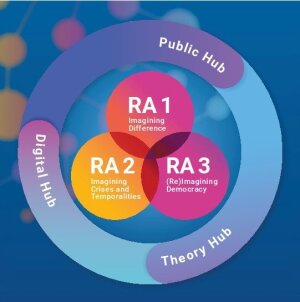
Social Imagining – Outline of the research programme
A functioning society requires not only rules, procedures and institutions, but also shared ideas, narratives and images. The social practices of sharing these ideas, narratives and images constitute what we call ‘social imagining’. It involves the creation of communally distributed, intersubjectively recognised imaginaries that provide orientation and stability in everyday life.
Social imagining can hold societies together and promote solidarity, but it can also generate differences and divisions. It can facilitate unity and forge bonds, but it can also lead to forms of exclusion and violence. It can strengthen and stabilise social structures, but it can also trigger new dynamics and spark change. Social imagining shapes current debates about the climate crisis and the future of the planet, public disputes over the pandemic, the wars in Ukraine and the Middle East, the future of democracy and the resurgence of right-wing extremist ideologies. For these reasons and more, social imagining is a topic of pressing relevance both in Germany and around the world.
Despite the long tradition of research on social imaginaries, the practices through which they gain their social and political significance and stimulate social and political dynamics have remained an epistemic ‘black box’. Our research makes an innovative contribution by focussing on these practices, processes and dynamics; hence our name Imaginamics: Practices and Dynamics of Social Imagining.
The Cluster of Excellence Imaginamics aims to develop a comprehensive understanding of social imagining. To this end, it (1) combines research approaches from the cultural sciences, humanities and social sciences; (2) links foundational theoretical approaches with empirical studies and digital explorations; (3) expands upon current debates on social imagining by including transepochal and trans-cultural perspectives; (4) develops a set of instruments to describe and explain social dynamics more precisely and to enable critical reflection on them.
Structurally, Imaginamics is anchored in the LIBERTY research profile area of the University of Jena. Scientists in early stages of their careers are already researching on topics related to social imagination:
Structure of the research programme
Structure of the research programme of Imaginamics
Image: werkraum_media, D–99423 WeimarThe interdisciplinary work of Imaginamics is divided into three Research Areas and three transversal Hubs. The Areas and Hubs are designed to mobilise innovation potential and focus on issues that are relevant to contemporary societies. The Research Areas and Hubs will be implemented from the outset as a permanent, overarching structure in which alternating working groups lasting 2 to 4 years will be set up. In this way, Imaginamics crystallises around the long-standing research interests of our Principal Investigators and will boost the research strengths of the FSU and the participating institutions.
The joint work in the Research Areas and Hubs is organised in two overarching formats that can be flexibly
adapted: in Working Groups and Forums.
Research Area 1: Imagining Difference
Research Area 1: Imagining Difference focuses on the role of social imagining in the emergence and persistence of differences. Practices of social imagining take place in social constellations that are characterised by existing differences. However, they also play a significant role in the formation of such differences. Thus, the emergence and perpetuation of social differences is one of the most powerful dynamics triggered by social imagining. RA1 examines, for instance, the profound significance that imagining difference can have for racialised and colonial practices of social imagining.
Working Groups Research Area 1:
- Creating Race, Reinventing Identity – Imagining the (De)Colonial in Europe and Latin America (16th to 21st Century): The Working Group examines the interrelations of 1) colonial practices of imagining by focusing on the long history of skin colour and its racialisation, and 2) decolonial practices of imagining and strategic reinventions of indigenous identities as performed in contemporary Mapuche poetry.
- Mediating Difference, Substantiating Truth – Liminal Figures between Religion and Science: The Working Group examines imaginations of liminal and mediating figures between science and religion (e.g. the heretic, the sage, the martyr) from antiquity to the present. Our perspective is rooted in the history of philosophy and historical epistemology.
Research Area 2: Imagining Crises and Temporalities
Research Area 2: Imagining Crises and Temporalities explores the temporal aspects of social imagining. Especially in periods of crisis, it is not only the content of social imaginaries that changes, but also the practices and temporality of social imagining. While social imagining is subject to change, it can also unleash its own dynamics by providing explanations of the crisis or articulating potentials for action by drawing upon social imaginaries. RA2 addresses contemporary issues like climate change and the challenges of the Anthropocene, but it also asks how social imaginaries of the Enlightenment, which itself can be seen as a response to crises, have been invoked in times of crisis.
Working Groups Research Area 2:
- “Enlightenment Now!?” Conflicting Imaginations of Enlightenment in Contemporary Crisis Debates: How does our present imagine enlightenment? By analysing political contexts and communication processes (including social media debates), we want to better understand how a historically shaped repertoire of imaginations correlates with current problems and what future perspectives this opens up.
- Disruptive Imagining: Materialising Crises as Exceptional Events: The Working Group studies the temporality of the disruptive event, which is inherent in the concept of crisis. Of particular interest is how such crisis-like events are situated in or out of time and what role geoanthropological and social reference systems play in this.
- Conflicting Stories of Change: Storytelling in Times of Crisis: We combine theoretical and empirical perspectives from communication psychology, literature research and cultural studies to explore how storytelling shapes social imaginaries. We focus especially on narratives on migration and conspiracies and aim to develop an interdisciplinary research agenda.
Research Area 3: (Re-)Imagining Democracy
Research Area 3: Reimagining Democracy studies the role of imagining in current challenges to democracies. It explores how democracies, like any political order, are stabilised by practices of social imagining that
reproduce their foundational imaginaries, and how they tend to be undermined by challenging forms of alternative social imagining. Here, too, it is not only the content of social imaginaries that supports or endangers democracies, but also the practices in which social imagining takes place. RA3 addresses developments
that can be observed in the immediate vicinity of our Cluster, in Thuringia in eastern Germany, but it also analyses the profound changes in social imagining that are associated with the digital transformation.
Working Groups Research Area 3:
- Spatial Imaginaries as Political Representations of Dictatorship, Democracy and Right-Wing Extremism in Eastern and Western Germany: The Working Group examines the historical emergence of spatial imaginaries in eastern and western Germany, their impact on polito-social practices and democratic politics, and how these imaginaries are articulated and mobilised by the far right.
- Hegemonic and Counter Imaginaries in/of a Digital Society: The Working Group deals with practices of reimagining society and democracy under the specific conditions of digitality. Based on the reciprocal intertwining of changes in communication technologies and changes in social imaginaries, dominant-hegemonic imaginations of a digital society are reconstructed and critically questioned on the one hand. On the other hand, it examines practices of countering (e.g., image practices on social media platforms) at the margins of these hegemonic imaginaries, which renegotiate the question of the formation of collectivity within the complex assemblage of human and more-than-human actors (such as platforms, datafication processes, and algorithms).
- Imagining the Democratic Self – Historical Trajectories: The Working Group picks up on a long tradition in political thinking that reflects on the need to root liberal democracy in everyday life and seeks to take it from the realm of political theory to empirical research, aiming to gain insights into practices of imagining the democratic self and their role in articulating conflicting interests and shaping the collective will. The Working Group seeks to challenge common perceptions of Eastern European societies as being historically immature and prone to authoritarian leanings.
Theory Hub
The Theory Hub is dedicated to the conceptual clarification and further theoretical differentiation of the guiding concept of ‘social imagining’ on a practice-theoretical basis. Taking up open questions in cultural and social theories, the Theory Hub aims to develop an overarching theoretical framework that addresses the preconditions, functioning and effects of social imagination. In doing so, the Hub itself further develops practices of theory work in a model-like manner by taking up the challenge of placing a variety of different concepts and theories in relation to one another.
Working Groups and Forums of the Theory Hub:
- Concepts and Theories: The Forum focuses on concepts and theories that are central to the understanding of social imagining. It works on a Living Handbook that will bring together key terms, explore important stages in their history and make a proposal as to how they can contribute to a comprehensive theory.
- Doing Research on Practices: The Forum addresses methodological issues. It asks how research approaches change when the study of practices takes centre stage.
- The Role of Images in Social Imagining: The Working Group seeks to identify and develop promising and innovative approaches to theorising social imagining. It asks what it means when social imagining is consistently conceptualised on the basis of images – be they mental or materialised.
Digital Hub
The Digital Hub builds bridges between research in the humanities and social sciences and application-orientated projects in computer science. The focus is on the relationship between (media) technology and social imagining practices, particularly with regard to the transformation of collective imaginary worlds through algorithms and virtual spaces. The research not only examines the ways in which digital technologies and media intervene in the process of social imagination. In close collaboration with computer science, the Digital Hub is also developing the technological foundations for researching the question of social imagination with the help of advanced research tools, including the further development of social virtual reality (SVR) technologies.
Working Groups and Forums of the Digital Hub:
- Imaginary Media – Before and Beyond the Digital Age (Forum): The Forum discusses the specific imaginary powers of media in social, political and cultural situations of crisis, in democracies and beyond and reflects on the fundamental shifts undergone by the imaginary of media since the 19th century and on the difference between digital and analog media technologies in an interdisciplinary perspective.
- Immersive Practices and Social Imagining (Forum): The Forum aims to develop, implement and evaluate various scenarios to investigate the impact of immersive social virtual reality technologies on social imagining. The goal is to advance the Cluster´s research by employing new communicative technologies and by drawing upon and/or conducting research on user behaviour to improve and reflect on these technologies.
- Understanding Socio-Technical Imagining (Working Group): This working group focuses on the question of how practices of social imagining can be described and conceptualized under the conditions of digital culture and technology. How do algorithms change these practices and which theorems and concepts can be mobilized to understand their impact?
Public Hub
Academic research, non-university research, citizen science and civil society interact in the Public Hub. Taking up the high social relevance of the research topic, it sees itself as a testing ground for new forms of dialogue between science and the non-university public. This networking function is based on the extensive expertise of the participating cooperation partners in cultural policy work and science communication, including the Klassik Stiftung Weimar, the Buchenwald and Mittelbau-Dora Memorials Foundation and the Ettersberg Foundation.
Forum of the Public Hub:
- Normative and Political Implications of Research on Social Imagining: The Forum brings into focus the political orientation of research on social imagining as well as the ethical questions about the risk of such research being misused by extremist, populist and anti-democratic actors and movements.
